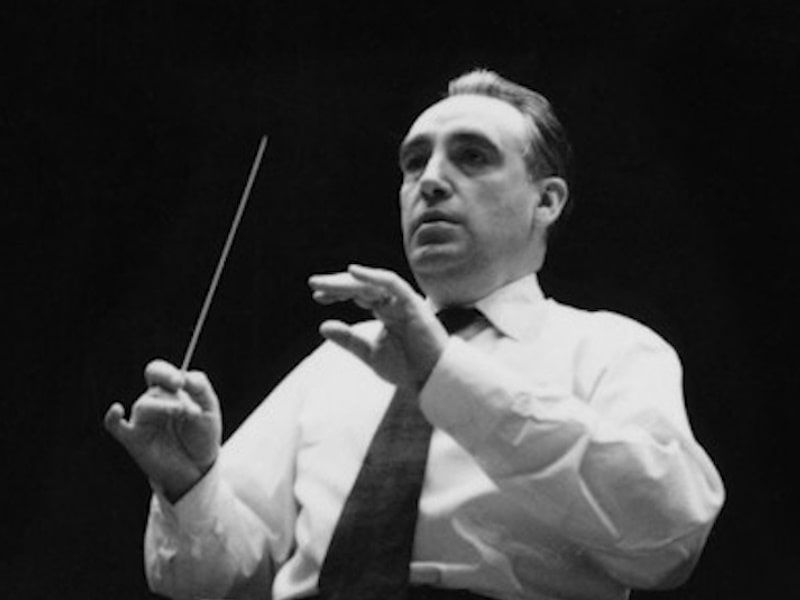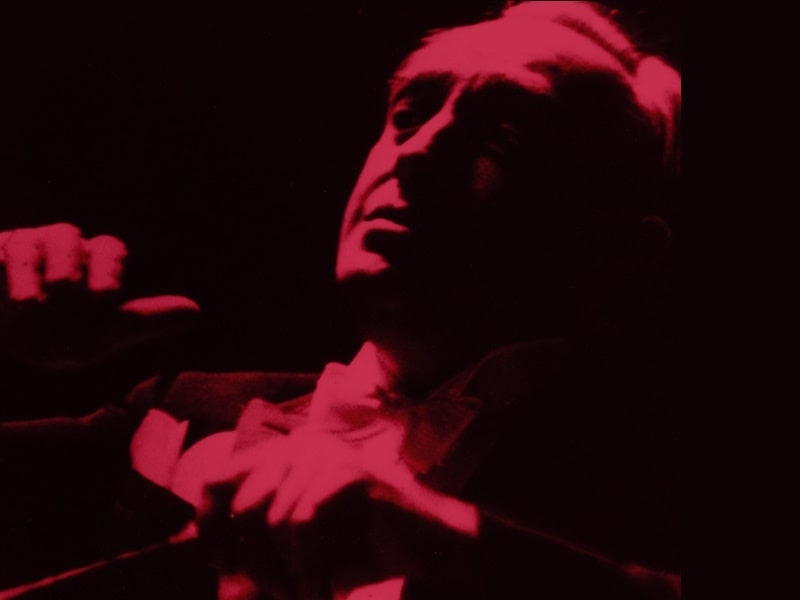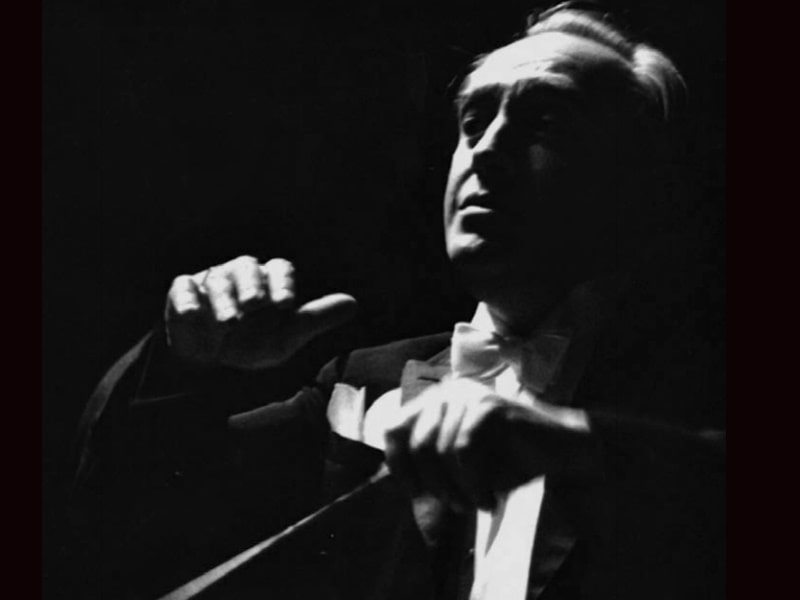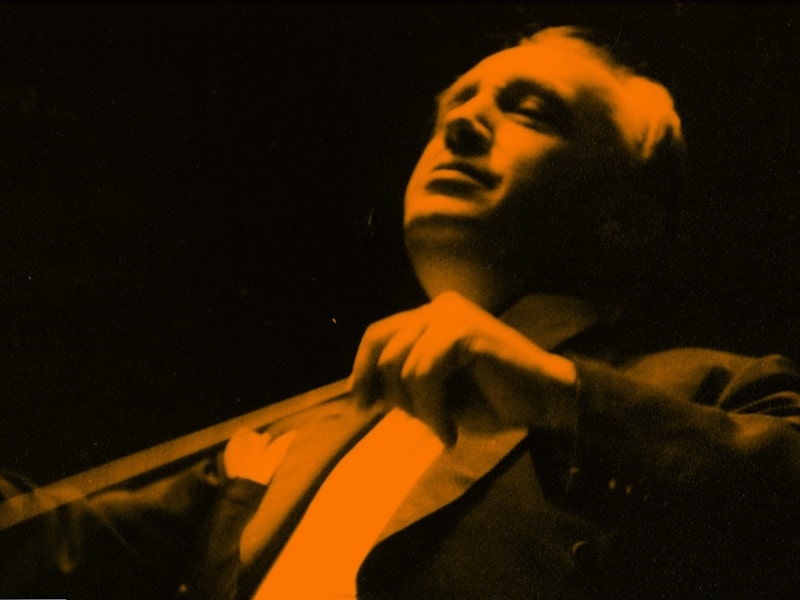BIOGRAPHY
"Now I can die in peace because my successor will be Constantin Silvestri!" (George Enescu)Constantin Silvestri (b. 31 May 1913, Bucharest, Romania – d. 23 February 1969, London, England, The United Kingdom) was a Romanian conductor, composer, and pianist. He settled in England in 1959 and became a British national in 1967.
Constantin Silvestri made his first public appearance as a musician when he was ten years old, giving a piano recital. Then he studied at the Conservatory in Bucharest with Mihail Jora (composition) and with Florica Musicescu (piano). He was closely guided by George Enescu and double bassist Joseph Prunner, his uncle.
As a conductor, Silvestri was a self-learner. However, the very close relationship between the young Silvestri and Ionel Perlea leads us to believe that Silvestri was initiated in the art of conducting by the great conductor, a close friend of the Prunner-Silvestri family.
Constantin Silvestri launched his professional career as a pianist and was noted for his powerful improvisations in the styles of
distinguished composers, but as he stated during this period, “My ultimate aim is the baton.” Silvestri’s success in the 1930
National Radio Orchestra of Romania concert persuaded him to follow conducting as a career. He conducted at the Romanian National
Opera from 1935 on. He also directed the Bucharest Philharmonic Orchestra (1947-1953) for six years, succeeding George
Georgescu. In 1953 Silvestri became the director of the Romanian National Opera in Bucharest. However, he would mainly
conduct the Romanian National Radio Symphony Orchestra.
From 1948 to 1956, Silvestri taught at the Bucharest Conservatory where he founded the Conducting Department. Among Silvestri’s students were Sergiu Comissiona, Marius Constant, Anatol Vieru, Iosif Conta, Edgar Cosma, and others. By the 1950s Silvestri was accepting guest engagements in the USSR, Czechoslovakia, and Hungary, as well as in the United Kingdom, France, Belgium, etc. As a result of the impact of these concerts, he was invited to conduct the London Philharmonic Orchestra in 1957 and the success of this debut led to the offer of both concert engagements and recordings with EMI, both of which in turn helped to develop his reputation internationally. During this time Silvestri’s recording of Dvořák’s Symphony No. 9 ‘From the New World’ was awarded the First Prize, and that of Enescu’s ‘Dixtuor for Wind Instruments’ the Grand Prix du Disque, both by the Charles Cros Academy in France.
His career in Romania came to a climax in 1958 with the highly successful Romanian premiere of ‘Oedipe’ by George Enescu in Bucharest, at the first edition of the “George Enescu” Festival and Contest. Constantin Silvestri was the president of the piano competition.
After conducting Shostakovich’s Symphony No. 1 in Moscow, he was congratulated backstage by the composer, who told him: “I re-lived the creation of my symphony during this performance. If I were to conduct it myself, I would probably do it the same way.”
In January 1959 Constantin Silvestri left Romania for good, living initially in Paris, then in the United Kingdom. Between 1959 and 1961 the artist would travel the world, giving concerts together with the greatest orchestras. The first tour took place in America where he conducted the Chicago Symphony Orchestra. He also made a tour in South Africa. On the second US tour he conducted the Philadelphia Symphony Orchestra. He took part with a concert in the Besançon Festival together with the conductors and pianists Lorin Maazel, Georg Solti, Charles Münch, Wilhelm Kempf, Wilhelm Backhaus. He also toured Mexico, Australia, and, of course, Europe (Berlin, Paris, Manchester, Cologne etc.).
The most notable appointment of Silvestri’s career came in 1961 when he accepted the position of chief conductor of the Bournemouth Symphony Orchestra. He became strongly attached to both the orchestra and to this seaside town on the English south coast, making his home there. Through extensive and taxing rehearsal he raised the playing of the Bournemouth Symphony Orchestra to an international standard. Together they appeared at the Edinburgh Festival in 1963, undertook a tour of Europe during 1965, and recorded extensively. In addition to his commitments in Bournemouth, Silvestri continued to conduct leading international orchestras in Europe, the Far East, and the USA. He appeared at the Royal Opera House, Covent Garden, in 1963 leading a new production of Mussorgsky’s Khovanshchina. Silvestri became a British citizen in 1967, but his career was prematurely cut short by cancer, of which he died in a London hospital in 1969, aged only fifty-five, following his final concert given in Exeter. The words of the epitaph on his memorial stone in the churchyard of St Peter’s, Bournemouth, appropriately describe him as “an outstanding musician and a remarkable man.”
In 2013, EMI re-issued most of his recordings in the series “The Legendary Conductor” with that company in a 15-disc set in which one reviewer noted the performances’ “consistent character and quality.” Alongside Tchaikovsky’s symphonies 4-6 and Manfred, there was much other Russian music, Dvořák symphonies 7-9, and works by Bartok, Hindemith, Berlioz, Franck, Ravel, and Debussy.
Constantin Silvestri is to this day the only Romanian conductor to have recorded with the Vienna Philharmonic.
From 1948 to 1956, Silvestri taught at the Bucharest Conservatory where he founded the Conducting Department. Among Silvestri’s students were Sergiu Comissiona, Marius Constant, Anatol Vieru, Iosif Conta, Edgar Cosma, and others. By the 1950s Silvestri was accepting guest engagements in the USSR, Czechoslovakia, and Hungary, as well as in the United Kingdom, France, Belgium, etc. As a result of the impact of these concerts, he was invited to conduct the London Philharmonic Orchestra in 1957 and the success of this debut led to the offer of both concert engagements and recordings with EMI, both of which in turn helped to develop his reputation internationally. During this time Silvestri’s recording of Dvořák’s Symphony No. 9 ‘From the New World’ was awarded the First Prize, and that of Enescu’s ‘Dixtuor for Wind Instruments’ the Grand Prix du Disque, both by the Charles Cros Academy in France.
His career in Romania came to a climax in 1958 with the highly successful Romanian premiere of ‘Oedipe’ by George Enescu in Bucharest, at the first edition of the “George Enescu” Festival and Contest. Constantin Silvestri was the president of the piano competition.
After conducting Shostakovich’s Symphony No. 1 in Moscow, he was congratulated backstage by the composer, who told him: “I re-lived the creation of my symphony during this performance. If I were to conduct it myself, I would probably do it the same way.”
In January 1959 Constantin Silvestri left Romania for good, living initially in Paris, then in the United Kingdom. Between 1959 and 1961 the artist would travel the world, giving concerts together with the greatest orchestras. The first tour took place in America where he conducted the Chicago Symphony Orchestra. He also made a tour in South Africa. On the second US tour he conducted the Philadelphia Symphony Orchestra. He took part with a concert in the Besançon Festival together with the conductors and pianists Lorin Maazel, Georg Solti, Charles Münch, Wilhelm Kempf, Wilhelm Backhaus. He also toured Mexico, Australia, and, of course, Europe (Berlin, Paris, Manchester, Cologne etc.).
The most notable appointment of Silvestri’s career came in 1961 when he accepted the position of chief conductor of the Bournemouth Symphony Orchestra. He became strongly attached to both the orchestra and to this seaside town on the English south coast, making his home there. Through extensive and taxing rehearsal he raised the playing of the Bournemouth Symphony Orchestra to an international standard. Together they appeared at the Edinburgh Festival in 1963, undertook a tour of Europe during 1965, and recorded extensively. In addition to his commitments in Bournemouth, Silvestri continued to conduct leading international orchestras in Europe, the Far East, and the USA. He appeared at the Royal Opera House, Covent Garden, in 1963 leading a new production of Mussorgsky’s Khovanshchina. Silvestri became a British citizen in 1967, but his career was prematurely cut short by cancer, of which he died in a London hospital in 1969, aged only fifty-five, following his final concert given in Exeter. The words of the epitaph on his memorial stone in the churchyard of St Peter’s, Bournemouth, appropriately describe him as “an outstanding musician and a remarkable man.”
In 2013, EMI re-issued most of his recordings in the series “The Legendary Conductor” with that company in a 15-disc set in which one reviewer noted the performances’ “consistent character and quality.” Alongside Tchaikovsky’s symphonies 4-6 and Manfred, there was much other Russian music, Dvořák symphonies 7-9, and works by Bartok, Hindemith, Berlioz, Franck, Ravel, and Debussy.
Constantin Silvestri is to this day the only Romanian conductor to have recorded with the Vienna Philharmonic.




